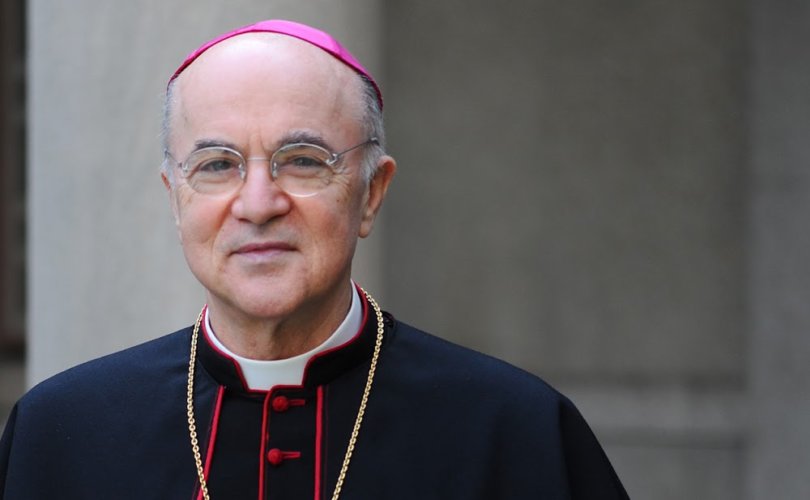VANCOUVER, B.C., Canada, February 4, 2019 (LifeSiteNews) – The Vancouver archdiocesan newspaper issued sharp criticisms of whistleblower and former U.S. nuncio Archbishop Carlo Maria Viganò and refused to allow corrections of the criticism when submitted, claiming that doing so would widen divisions in the Church.
Penned by a high-ranking prelate in the archdiocese, the article painted Viganò in a negative light, suggesting that Viganò had gone to the media without consulting with the Pope.
“However, a good son must first speak in secret with his father and not go to the media or assume a role that does not belong to him,” wrote Monsignor Pedro Lopez-Gallo, judicial vicar of the diocese for over 35 years.
Letters sent to the editor by Vancouver Catholics tried to correct the record by noting that Viganò had spoken with Francis prior to going public with his testimonies, and that silence on the part of clerics is how McCarrick was able to persist in being abusive and rise to power. But the corrections were rejected.
Msgr. Gallo charged in his column for the November 20, 2018 issue of the The B.C. Catholic that “it was wrong” of Archbishop Viganò “to disclose information that was under pontifical secrecy and accuse the Pope of ignoring claims made against important prelates of the Holy See.”
But the letter writers pointed out how Viganò had made clear that the purpose of the pontifical secret is to protect the Church from her enemies, not protect them. Viganò was compelled to go public with the information, they said, after the inaction and apparent complicity he encountered from Church hierarchy.
The letters had been forwarded to Vancouver Archbishop J. Michael Miller, CSB, and The B.C. Catholic’s Editor Paul Schratz advised the two Catholics their letters did make some valid points.
LifeSiteNews inquired with Schratz and the archdiocese, asking whether Miller had given any directive prohibiting The B.C. Catholic from publishing letters that support Viganò or his testimonies.
Schratz told LifeSiteNews there is no such directive. Letters are considered on an individual basis, he said, at times involving a judgment call. Schratz said editorially the publication is trying to build unity in the Church right now, hence the decision to not run the letters. Schratz said he’s always happy to discuss decisions with writers if they disagree.
Countless Catholics of all walks of life have continually supported Viganò since the release of his first testimony in late August, while many progressive Catholics have denounced him and his testimony.
Under Popes John Paul II and Benedict XVI, Archbishop Miller was considered conservative by many. However, since Pope Francis’ reign, the Vancouver Archbishop has shed that reputation.
Archbishop Miller stunned orthodox Christians when in 2017 he signed onto a letter denouncing evangelical leader Franklin Graham, son of the famed preacher Billy Graham. As Graham was coming to speak in Vancouver, the letter signed by several left-leaning religious leaders and Archbishop Miller criticized Graham for making “disparaging and uncharitable remarks about Muslims and the LGBTQ+ community.”
The former apostolic nuncio’s call in his testimony for Pope Francis to step down was predicated upon the necessity that Francis “be the first to set a good example for cardinals and bishops who covered up McCarrick’s abuses” and that Francis “must acknowledge his mistakes…in keeping with the proclaimed principle of zero tolerance.”
Viganò also recounted in detail in his initial testimony that he in no uncertain terms gave warning about McCarrick to Pope Francis on June 23, 2013, the first time they’d met after Francis’ election, and how Francis was not surprised by the information.
Viganò explained in a subsequent testimony why he’d broken the pontifical secret, a pledge of confidentiality taken by some employees of the Vatican Curia and the Vatican diplomatic corps.
“Certainly, some of the facts that I was to reveal were covered by the pontifical secret that I had promised to observe and that I had faithfully observed from the beginning of my service to the Holy See,” he said. “But the purpose of any secret, including the pontifical secret, is to protect the Church from her enemies, not to cover up and become complicit in crimes committed by some of her members.”
“I was a witness,” Viganò continued, “not by my choice, of shocking facts and, as the Catechism of the Catholic Church states (par. 2491), the seal of secrecy is not binding when very grave harm can be avoided only by divulging the truth. Only the seal of confession could have justified my silence.”
Viganò then followed in his September 29 testimony with a statement that remains valid today: “Neither the pope, nor any of the cardinals in Rome have denied the facts I asserted in my testimony.”

